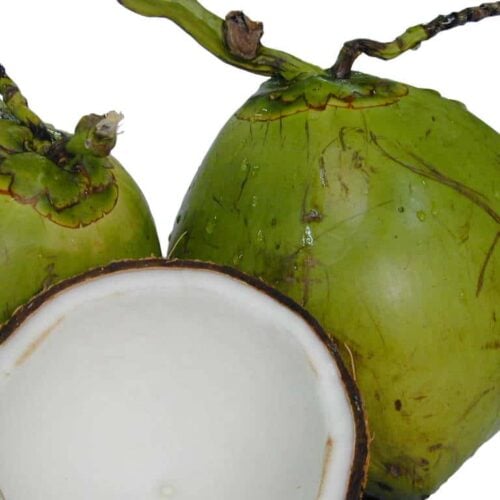Despite using coconut water, milk, meat and oil in many of my recipes, I have a love/hate relationship with coconut. My love affair with coconut began as a toddler when a nice Mexican man gave me a hunk of fresh coconut meat to teethe on during my parents’ vacation in Acapulco. I have lovingly done the same for my daughter.
Coconut is incredibly nutritious. It is unusually high in trace minerals and healthy, medium-chain fatty acids, like lauric acid (found otherwise only in human breast milk) and caprylic acid (a potent natural antiviral and antifungal).
Coconut oil can help reduce both your cholesterol ratio and your waistline. And if that weren’t enough, the water in a coconut has the same mineral and electrolyte profile as human blood plasma!
However, coconuts, like most tropical fruits eaten by Westerners, have a big, heavy transportation footprint. In most of the continental U.S., coconuts are not a local food. In fact, most coconuts are shipped thousands of miles from South America and Asia, using countless gallons of fossil fuels to bring their yummy goodness to your grocery store.
Because I live just a few miles from Mexico, I am hoping that I can find a more local source for my very moderate intake of organic coconuts. In the meantime, I am supporting a healthy internal ecosystem by making coconut water kefir and cultured coconut pudding this week.
Culturing Coconut
Coconut can be cultured and fermented in many different ways and at different stages of life. Coconut Milk and Coconut Milk Yogurt are made from the familiar hairy, brown, mature coconuts. Coconut water kefir and cultured coconut pudding, however, are made from young coconuts.
Instead of appearing hairy and brown, a young coconut, like all things in their youth, is green and smooth. Often the green outer shells are cut off before they are shipped to U.S. markets. Look for either the green shell or a cylindrical white “husk” if the outer shell has been removed.
You may not see them in the produce section of your big-chain supermarket, but they are readily available in Asian, Latino, and other ethnic or farmers’ markets. Many health food stores will carry them upon request.
Young coconut water is best fermented by adding either water kefir grains or a prepared kefir powder to it. Kefir (pronounced kuh-FEER) is a unique combination of probiotic bacteria and healthy yeast which consume the sugars in the coconut water, making the drink bubbly and delicious—like soda, but without all the chemicals and sugar.
Many people find kefir significantly more effective than probiotic supplements at dealing with digestive issues, candida overgrowth, leaky gut issues and food sensitivities.
The other benefit to drinking kefir is actually in the coconut water itself. Coconut water is a nutrient-dense beverage filled with minerals, vitamins, antioxidants, amino acids, enzymes, and growth factors, and it also has only a fifth of the sugar found in most fresh fruit juices. Fermenting it reduces the sugar even further and makes all of these nutrients even more available to your body.
If you make coconut kefir out of water kefir grains, you only have a one time cost of buying them, so they are much cheaper in the long run. You can also use the grains for fermenting other things as well. (Do not make coconut water kefir from dairy kefir grains; it will not ferment well, and the grains will quickly die without real milk to consume.)
If you make coconut kefir from powdered kefir packets, you can save a little portion of your batch and then add it to a new jar of coconut kefir. You can keep repeating this process of saving a bit from one batch and adding it to the next until it loses it’s fermenting power. So while the packets are a bit expensive, you can stretch them out over a couple of batches.
Related:

Coconut Water Kefir
Ingredients
- 1 quart coconut water, (Water from inside 3-4 young coconuts)
- 1 Tbsp. water kefir grains
Instructions
- Sterilize all your equipment, especially your jars.
- Carefully open coconuts using a cleaver or hatchet, conserving the water. (How-to video here)
- Conserve the young coconut spoonmeat inside and use for Cultured Coconut Pudding (recipe below), smoothies or desserts.
- Heat the coconut water to about 90 degrees.
- Add kefir grains and stir in thoroughly; they won’t dissolve.
- Pour the inoculated water into a sterile jar and either cap loosely or place the airlock lid.
- Ferment at 72-75 degrees F for 36-48 hours. In the summer, this could mean your countertop. In winter, the top of the fridge. Avoid agitating the jar.
- The water will get milky white and usually a bit of bubbles will form on top. The taste should be slightly tart and tangy with only a little of the original sweetness.
- Refrigerate after fermentation. It will continue to ferment, but the process will be much slower. Will last about a week.
- Save 1/4 cup from each batch (including the kefir grains, if using) to inoculate the next quart of kefir, instead of using a new packet. (Or save 1/2 cup to make 1/2 gallon, or 1 cup to make 1 gallon)
- This procedure can be repeated up to 7 times. Inoculate a new batch within 3 days of removing culture from the previous batch.
- Stir in crushed fruit if you wish, and enjoy with meals and before bed to restore your digestive health.
Nutrition
Recommended for This Recipe

Cultured Coconut Pudding
Ingredients
- 3-4 young coconuts
- 1 Tbsp. water kefir grains
- coconut water
- ½ tsp. cardamom, cinnamon or nutmeg
- fresh fruit, optional
Instructions
- Open the young coconuts and conserve most of the the water for Coconut Water Kefir (recipe above). The meat should be white. If it is pink or gray, it should be discarded.
- Scoop the meat out with a strong spoon or spatula.
- Rinse any brown skin off the meat.
- Put the coconut meat in a blender and purée with just enough water to create a pudding-like consistency.
- Add a teaspoon of kefir grains. Pulse to incorporate.
- Transfer the pudding to a glass or ceramic container, making sure there are a few inches of room on the top for the pudding to expand.
- Cover the container and let it ferment on your countertop or on top of your fridge at about 72-75 degrees for 7-10 hours.
- After fermentation, add cardamom or cinnamon and nutmeg and stir in.
- Refrigerate. It will last about 3 days.
- Enjoy for dessert with fresh strawberries or other toppings.












